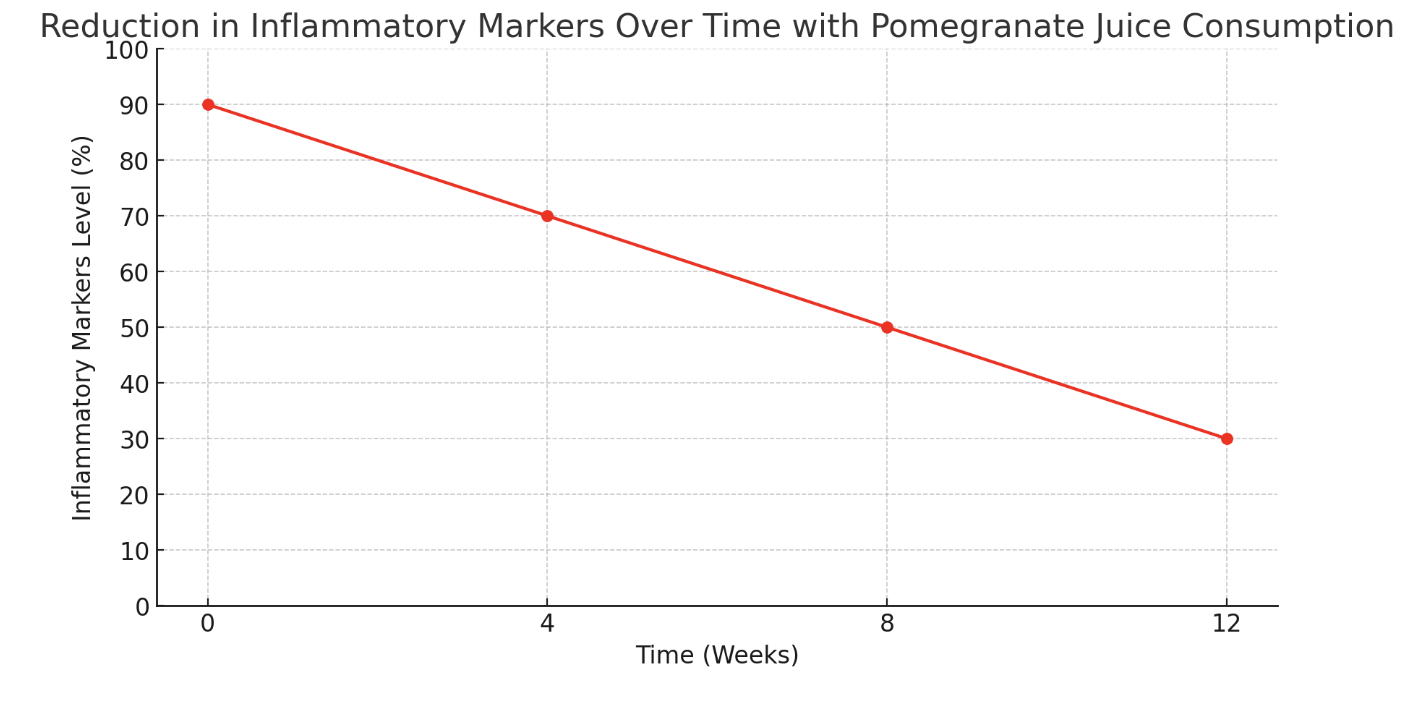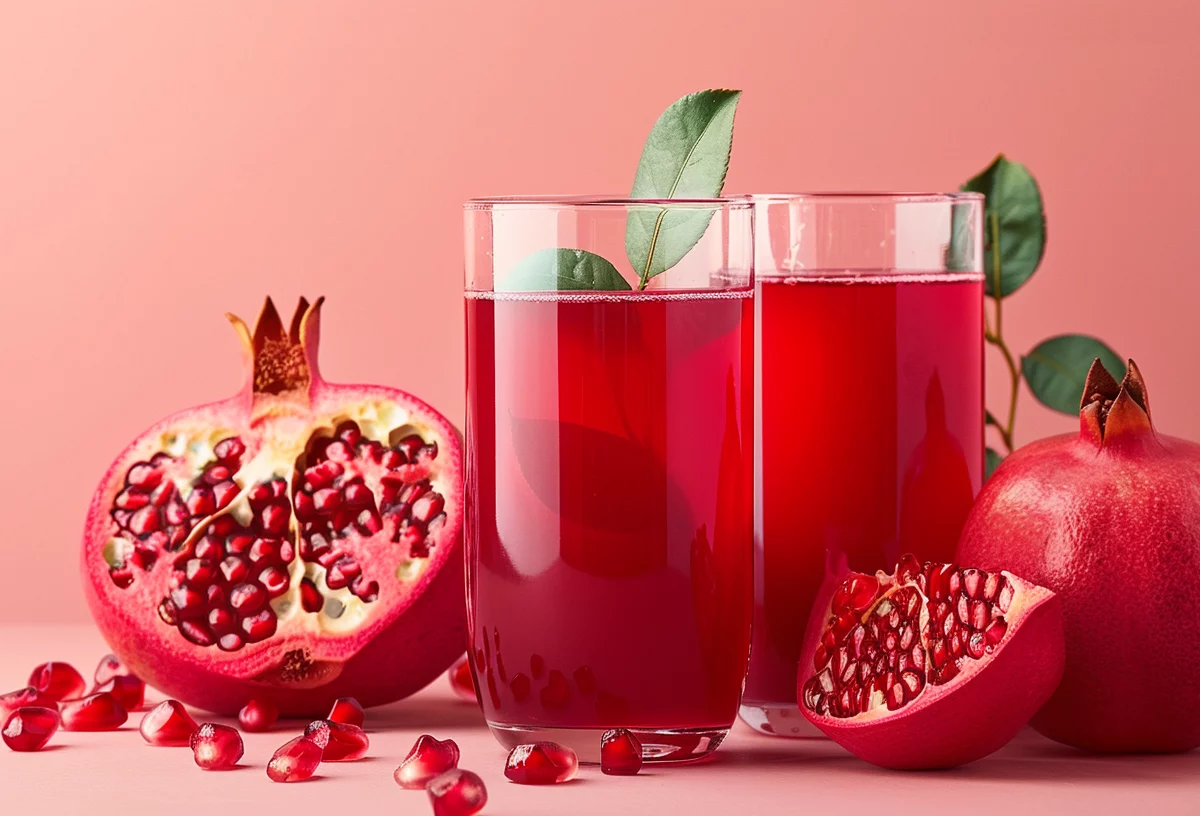In this article, we’ll explore the real impact of pomegranate juice on your digestive system.
Pomegranate has been praised for its potential health benefits, and studies suggest it may promote good digestion.
A 2017 review noted that pomegranate polyphenols, due to their anti-inflammatory properties, could benefit people with inflammatory bowel disease and other digestive issues.
However, some individuals have reported experiencing mild digestive discomfort, such as diarrhea, after consuming pomegranate. So, what’s the truth?
Let’s examine the science behind pomegranate juice and its effects on your gut health.
Historical Significance of Pomegranates

Pomegranates have been cherished for thousands of years and are mentioned in ancient Greek, Persian, and Egyptian mythology.
These cultures utilized pomegranates for medicinal purposes, recognizing their potential health benefits. Traditional medicine uses pomegranates to treat various ailments, including digestive issues, infections, and skin conditions.
Nutritional Overview of Pomegranate Juice
| Nutrient | Amount per Serving | % Daily Value (DV) |
|---|---|---|
| Vitamin C | 18 mg | 20% |
| Vitamin K | 16.4 mcg | 14% |
| Vitamin E | 0.1 mg | 1% |
| Potassium | 533 mg | 11% |
| Calories | 136 kcal | – |
| Total Carbohydrates | 32.7 g | – |
| Sugars | 31.5 g | – |
| Dietary Fiber | 0.6 g | 2% |
Pomegranate juice is a rich source of essential nutrients contributing to overall health. It contains potent antioxidants called polyphenols, which help combat oxidative stress in the body.
Specifically, pomegranates are known for their high ellagitannins, anthocyanins, and punicalagin content.
Scientific Studies

1. Study Summaries
- A 2017 review published in the journal “Evidence-Based Complementary and Alternative Medicine” examined the potential benefits of pomegranate for IBD. The authors concluded that pomegranate’s anti-inflammatory and antioxidant properties could be beneficial for managing IBD symptoms. They highlighted animal studies demonstrating reduced gut inflammation and improved intestinal barrier function with pomegranate supplementation.
- Another study, published in the “Journal of Inflammation Research” in 2016, investigated the effects of pomegranate extract on ulcerative colitis in mice. The researchers found that pomegranate extract reduced inflammation, oxidative stress, and tissue damage in the colon, suggesting its potential as a complementary therapy for IBD.
2. Counterpoints
- While pomegranate juice promises digestive health, it’s important to note that some individuals may experience mild side effects. In rare cases, consuming large amounts of pomegranate juice has been associated with diarrhea and abdominal discomfort.
- Moreover, due to its vitamin K content, pomegranate juice may interact with certain medications, such as blood thinners. Individuals with pre-existing health conditions or those taking drugs should consult their healthcare provider before incorporating pomegranate juice into their diet.
Myths About Pomegranate Juice and Digestion
Myth 1: Pomegranate Juice Works as a Quick Detox for the Digestive System

Fact: While pomegranate juice contains antioxidants that can help protect cells from damage, the concept of a “quick detox” is not scientifically supported. Detoxification is a complex process involving multiple organs, such as the liver and kidneys, and cannot be achieved solely by consuming any single food or beverage.
The human body is equipped with detoxification mechanisms, and maintaining a balanced diet, staying hydrated, and engaging in regular physical activity are more effective ways to support overall health and the body’s natural detoxification processes.
Myth 2: Drinking Pomegranate Juice Cures Stomach Ulcers

Fact: No scientific evidence suggests drinking pomegranate juice can cure stomach ulcers. Stomach ulcers are typically caused by an infection with Helicobacter pylori or certain medications, such as nonsteroidal anti-inflammatory drugs (NSAIDs).
While pomegranate juice may help manage inflammation in the digestive tract due to its anti-inflammatory properties, it is not a substitute for medical treatment. If you suspect you have a stomach ulcer, it is essential to consult a healthcare professional for an accurate diagnosis and appropriate treatment plan.
Myth 3: Pomegranate Juice Is an Effective Treatment for Chronic Constipation

Fact: Although pomegranate juice may aid digestion due to its fiber content and potential to promote the growth of beneficial gut bacteria, it is not a medically approved treatment for chronic constipation. Chronic constipation can have various underlying causes, such as dehydration, lack of dietary fiber, or certain medical conditions.
While drinking pomegranate juice may provide some relief in mild cases, it is not a substitute for addressing the root cause of the issue. If you experience chronic constipation, it is important to consult a healthcare provider to identify the underlying cause and develop an appropriate treatment plan, which may include dietary changes, lifestyle modifications, or medication.
Myth 4: Pomegranate Juice Can Replace Digestive Medications

Fact: While pomegranate juice may offer some digestive health benefits, it should not replace prescribed digestive medications without consulting a healthcare provider. Digestive medications are specifically formulated to target specific conditions and symptoms, and a medical professional should guide their use.
Pomegranate juice can be consumed as part of a healthy diet to support digestive health, but it is not a substitute for medical treatment. If you are considering making changes to your medication regimen, it is crucial to discuss this with your healthcare provider to ensure the safety and effectiveness of your treatment plan.
Myth 5: Consuming Pomegranate Juice Daily Completely Prevents Digestive Diseases

Fact: While regular consumption of pomegranate juice may support digestive health due to its anti-inflammatory and antioxidant properties, it cannot completely prevent digestive diseases. Digestive diseases can have various causes, including genetic factors, environmental influences, and lifestyle choices.
Maintaining a balanced diet, staying hydrated, managing stress, and engaging in regular physical activity are all important factors in promoting digestive health and reducing the risk of certain digestive diseases. However, no single food or beverage can guarantee the complete prevention of digestive diseases.
Regular check-ups with a healthcare provider and following their recommended preventive measures are essential for optimal digestive health.
Broader Health Implications
1. Heart Health

Link Between Digestion and Cardiovascular Health
Maintaining a healthy digestive system can positively impact cardiovascular health. The gut microbiome is crucial in regulating inflammation throughout the body, including the cardiovascular system.
An imbalance in gut bacteria, known as dysbiosis, has been linked to an increased risk of heart disease. Pomegranate juice may indirectly support cardiovascular health by promoting a healthy gut environment.
Specific Benefits
The antioxidants found in pomegranate juice, particularly punicalagin and ellagitannins, have been shown to reduce oxidative stress in the body. Oxidative stress occurs when an imbalance between free radicals and antioxidants leads to cell damage and inflammation.
By neutralizing free radicals, the antioxidants in pomegranate juice may help lower the risk of cardiovascular diseases, such as atherosclerosis and heart attacks.
2. Cancer Prevention and Immune Support

Cancer Prevention
Several studies have investigated the potential role of pomegranate juice in reducing the risk of various cancers. In laboratory studies, the high levels of antioxidants in pomegranate juice, especially ellagitannins, have been shown to inhibit the growth and spread of cancer cells.
While more human studies are needed, the existing research suggests that regular consumption of pomegranate juice may help lower the risk of certain cancers, such as prostate, breast, and colon cancer.
Immune Enhancement
Pomegranate juice is a rich source of vitamins and minerals that support the immune system. Vitamin C, in particular, is a potent antioxidant that helps stimulate the production and function of white blood cells, essential for fighting infections.
The vitamin E content in pomegranate juice also contributes to immune health by protecting cell membranes from oxidative damage.
Additionally, pomegranate juice’s anti-inflammatory properties may help regulate the immune response and prevent chronic inflammation, which can weaken the immune system over time.
General Health Benefits of Pomegranate Juice

1. Antioxidant Power
- High levels of antioxidants like punicalagin and hydrolyzable tannins.
- It fights free radicals, reduces oxidative stress, and lowers the risk of chronic diseases such as heart disease and cancer.
2. Blood Pressure Reduction
- Regular consumption has been shown to lower systolic blood pressure.
- It improves endothelial function and increases nitric oxide production, aiding in vascular relaxation and blood flow.
3. Anti-bacterial and Anti-viral Properties
- Exhibits significant antibacterial activity against oral pathogens such as Streptococcus mutans.
- It shows antiviral effects against influenza and herpes simplex viruses, potentially preventing viral infections.
4. Skin Health
- Rich in vitamin C, it is essential for collagen production, which supports skin structure and elasticity.
- Antioxidants like ellagic acid protect against UV damage and promote skin regeneration, potentially reducing signs of aging.
5. Anti-inflammatory Effects
- It is beneficial for chronic inflammatory conditions like arthritis and asthma.
- It contains polyphenols like ellagitannins that reduce the production of pro-inflammatory compounds.
Consumer Considerations

1. Usage Tips
To incorporate pomegranate juice into your daily diet, consider the following tips:
- Drink a small glass (4-8 ounces) of pomegranate juice in the morning or with meals.
- Pomegranate juice can be used as a smoothie base or mixed with other fruit juices for added flavor and nutrition.
- Be mindful of potential interactions with medications, such as blood thinners, and consult your healthcare provider before adding pomegranate juice to your diet if you have any pre-existing health conditions or concerns.
2. Precautions
While pomegranate juice can be a healthy addition to most diets, it is important to consume it in moderation. Here are some precautions that you can take:
| Precaution Category | Details |
|---|---|
| Interactions with Medications | Pomegranate juice can interact with blood thinners like warfarin, affecting their efficacy. It may also involve medications metabolized by certain liver enzymes, such as cytochrome P450. |
| Diabetes Management | Pomegranate juice contains natural sugars, which can impact blood glucose levels. Individuals with diabetes should monitor their sugar intake and consider the glycemic load of pomegranate juice. |
| Kidney Health | High in potassium, pomegranate juice might not be suitable for individuals with kidney disorders who need to control their potassium levels. |
| Allergies | Though rare, some people might be allergic to pomegranates. Symptoms could include itching, swelling, and difficulty breathing. |
| Dental Health | Due to its acidity, regular consumption of pomegranate juice may contribute to dental erosion. To minimize the time it spends on teeth, it’s advisable to rinse with water after drinking or to consume it with meals. |
| Pregnancy and Breastfeeding | Generally considered safe, pregnant and breastfeeding women should consult their healthcare provider before making significant dietary changes, including regular consumption of pomegranate juice. |
| Gastrointestinal Discomfort | Some individuals may experience digestive discomfort, such as acid reflux or diarrhea, especially when consumed in large amounts. It’s advisable to start with small quantities to assess tolerance. |
Conclusion
In conclusion, pomegranate juice offers many potential digestive health and overall well-being benefits.
While it is not a cure-all or a replacement for medical treatment, incorporating this antioxidant-rich beverage into a balanced diet may help support gut health, reduce inflammation, and even lower the risk of certain chronic diseases.
As with any dietary change, consuming pomegranate juice in moderation and consulting with a healthcare provider to ensure it aligns with your health needs is essential.
By separating the facts from the myths and understanding the science behind this ancient fruit, you can decide whether pomegranate juice is right for you.
So, the next time you reach for a refreshing drink, consider the potential benefits of this delicious, ruby-red elixir.
Frequently Asked Questions
What Does Pomegranate Juice Do For Your Gut?
Due to its antioxidants and fiber content, pomegranate juice may support gut health by reducing inflammation, promoting beneficial bacteria growth, and aiding digestion.
What is the Best Time to Drink Pomegranate Juice?
The best time to drink pomegranate juice is in the morning or with meals, but consuming it in moderation at any time of day can provide health benefits.
Can People with Diabetes Drink Pomegranate Juice?
People with diabetes can drink pomegranate juice in moderation, but they should monitor their blood sugar levels and consult their healthcare provider, as it contains natural sugars.






